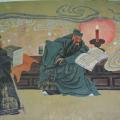5. Going Paperless: Ancient Chinese Texts
What were ancient Chinese philosophical texts written on? How did writing relate to orally transmitted wisdom? How were texts read and used? And what even counted as a “text” in ancient China?
Themes:
• R. Krijgsman, Early Chinese Manuscript Collections: Sayings, Memory, Verse, and Knowledge (Leiden: 2023).
• E.W. Maeder, “Some Observations on the Composition of the ‘Core Chapters’ of the Mozi,” Early China 17 (1992), 27-82.
• J. Makeham, Transmitters and Creators: Chinese Commentators and Commentaries on the Analects (Cambridge MA: 2003).
• M.E. Lewis, Writing and Authority in Early China (Albany: 1999).
• M. Loewe (ed.), Early Chinese Texts: a Bibliographical Guide (Berkeley: 1993).
• E.L. Shaughnessy, Before Confucius: Studies in the Creation of the Chinese Classics (Albany: 1997).
• T.H. Tsien, Written on Bamboo and Silk: The Beginnings of Chinese Books and Inscriptions (Chicago: 1962).
• X.G. Qiu, Chinese Writing, trans. G. Mattos and J. Norman (Berkeley: 2000).
• Special issue on early manuscript culture in China, ed. G.L. Lai and Q.E. Wang, Chinese Studies in History 50 (2017).





Comments
How many interviews for Confucianism mini series?
Based on your tentative episode lists, we're getting 13 episodes of Confucianism, so how many interviews do you plan on giving to Confucianism, 3 interviews?
Also one question which might be off-topic but related to episode length, do you plan on writing the scripts to be more than 20 minutes in length like you did for Africana? you might be able to squeeze more information when authors have expansive amount of literature of philosophy like you'll encounter in the 17th century Europe as their works are better preserved than earlier authors.
Interviews
Actually we have four interviews penciled in so far, so that may change. Re. episode length I find they are often going up around 25 minutes these days but 20-25 is still the goal. My thinking has always been that less than half an hour is good because listeners may find it less intimidating.
Why Cover Buddhism in China but not Neo Daosim
Professor Adamson, in the Indian series you've covered up to Dignaga (d.540CE) and you plan on stopping the coverage on Chinese Philosophy up to the Han dynasty but not continuing it during the Age of Disunity (220 CE - 589 CE).
However when looking at Karyn Lai book 'Introduction to Chinese philosophy' CUP, she did cover topics past the Han dynasty (even touching upon Chinese buddhist thoughts in the 4th/5th centuries C.E).
You and karyn Lai plan on covering several topics on Chinese Buddhism which should take us beyond the Han Dynasty time period, but you don't plan on covering Nao-Daosim which took place at the same time.
Age of Disunity is a period in which Neo-Daosim flourished and Buddhism started to take place, I recommend reading Chapter 5- Chapter 7 of Yu–lan Fung book 'History of Chinese Philosophy, Volume 2 – The Period of Classical Learning from the Second Century B.C. to the Twentieth Century A.D'.
Chapter 5- 'Neo-Daosim during the period of disunity Part I', Chapter 6- 'Neo-Daoism during the Period of Disunity Part 2' and chapter 7' Buddhism and it's critics during the period of disunity'.
So I do believe it would be a sizeable gap if you were to cover Chinese Buddhism in several episodes which would take us beyond the Han Dynasty demarcation period but not Neo Daoism .
Unless you want to cover Neo-Daoism in a future series and then going to back to cover early Chinese Buddhism to tie both series? Although Neo-Daoism is technically part of Classical Chinese era.
Dao Companion to Xuanxue by Springer is an excellent book.
https://plato.stanford.edu/entries/neo-daoism/
Neo-Daoism time period - 220CE- 420 CE (Three Kingdom period - Jin Dynasty period) which is part of the wider 'Age of Disunity' period.
Covering Chinese Philosophy during Sui-Tang Dynasty and onwards should be the starting point of the next series on Chinese Philosophy which would be the same era if you were and Jonardan Ganeri would continue with Later Post Dignaga Chinese philosophy (6th century). Both would be at a similar starting point, but skipping Neo-Daosim and trying to cover it in a later series would be awkward whilst covering Buddhism which is contemporaneous with Neo-Daosim period?
In reply to Why Cover Buddhism in China but not Neo Daosim by dukeofethereal
Neo-Daoism
Well the plan is not really to cover Buddhism in general, we only want to go up to the end of the Han period; so it's a chronological bound not a thematic one (hence I guess the podcast series does stop before her book did). I also think that for a future series it would probably be good to sort of start from the beginning with the story of how the various classical Chinese "schools" developed in various ways, so Neo-Confucianism, Neo-Daoism, etc.
Add new comment